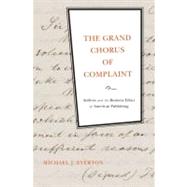The Grand Chorus of Complaint Authors and the Business Ethics of American Publishing
, by Everton, Michael J.- ISBN: 9780199751785 | 0199751781
- Cover: Hardcover
- Copyright: 6/16/2011
Do publishers have an ethical obligation to their authors and the reading public? Are they shameless profiteers out to nickel-and-dime na#xEF;ve authors and hapless consumers? Or are both parties keenly aware of the pecuniary stakes in book publishing? Questions such as these resonate powerfully in today's society, but they are far from new. As Michael Everton demonstrates in this incisive blend of book history and literary criticism, these concerns arose at the industry's very beginning in the U.S. He uses three lenses to show how book history can inform literary analysis. First, he offers close readings of fictions that actually take the book trade and its moral implications as their subject-most notably Fanny Fern's novelRuth Hall(where the prodigious female reporter is constantly cheated out of money by her greedy publisher) and Herman Melville'sPierre: or, TheAmbiguities(where the lead character desperately attempts to rescue himself from financial ruin by publishing a book). Secondly, Everton offers close readings of some texts--most notably Thomas Paine's "Common Sense" and Melville's "The Paradise of Bachelors and the Tartarus of Maids"--that are not explicitly about the ethics of publishing but that speak to the same ethical issues as those that galvanized debates between authors and publishers. He highlights how Melville and Paine's documented disputes with their publishers color these two very different literary creations. Finally, Everton offers rhetorical analyses of non-literary texts and events, showing how literary criticism has as much to offer book history as book history has to offer critics. The most sustained example of this is his examination of the 'vernacular' rhetoric deployed by non-specialists (mostly authors) who discussed copyright. As a whole, the book offers a pithy, engaging study of authorship, ethics, and book publishing in 18th- and 19th-century America.






